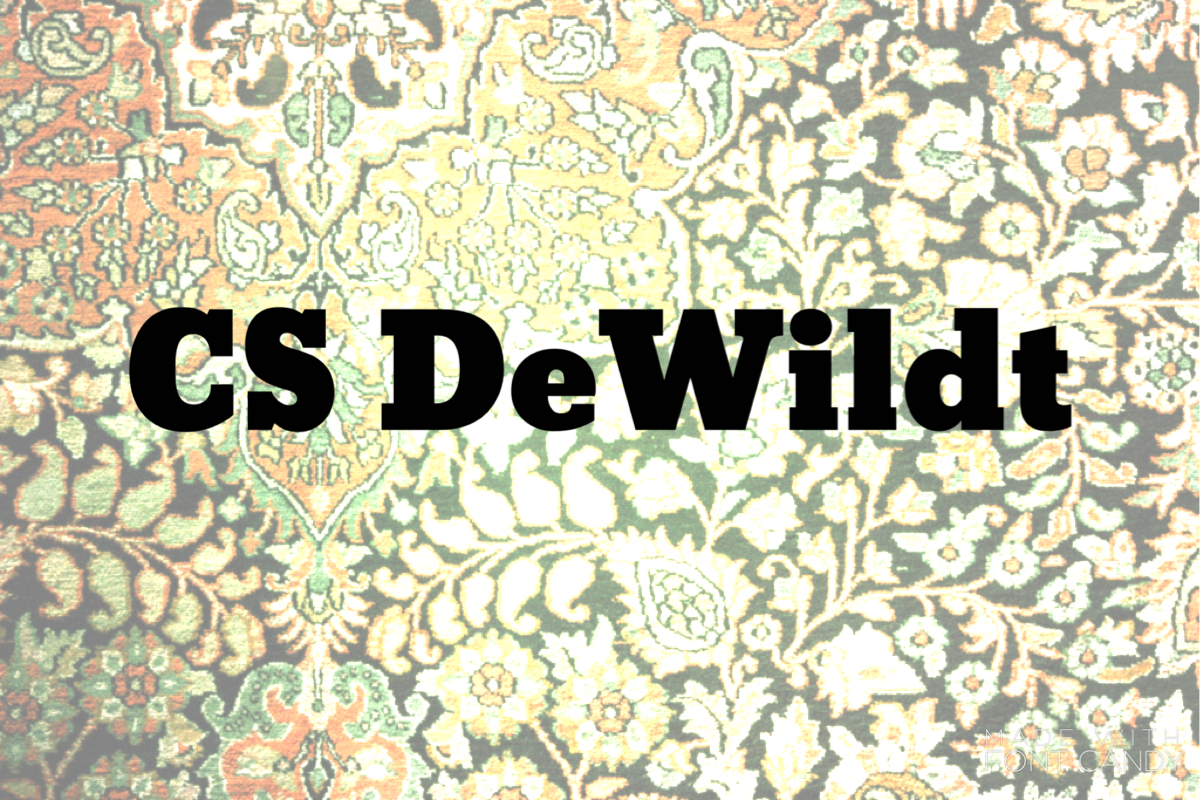
CS DeWildt is a name that kept popping up in different places on Facebook. I began reading his work because I found his online persona thoughtful, and, well, mysterious. The first story I read of his was “Corbin’s Dreams Take Flight,” published in Literary Orphans, Satchmo: Issue 05. There were two sentences in the story that struck me: “Corbin drew up the blinds and opened the window. He breathed dusty sunlight and pulled the dry flies out of the window track with the fingertips of his healing hand.” Details when doled out with precision and beauty always hit me hard. I knew after reading these two lines that I was going to love this story, and I was right.
CS DeWildt is a liar. He wants to hurt you. His work includes Dead Animals, a collection of shorts and flash, as well as the novella Candy and Cigarettes.
Free Kindle versions of Dead Animals and CS DeWildt’s latest, The Louisville Problem will be available for a limited time at Amazon.
Please visit at http://csdewildt.com or @csdewildt on Twitter.
I’ve conducted eight Conversations at this point, and there’s a divide between those writers who find it easy to write, and those who find it difficult. Writing for me is always personal, but not necessarily autobiographical. I put myself through the same mental (and, at times, physical) challenges that I dream up for my characters, which means I bleed a little to create. What about you? Does writing come easy for you or is it a bloodbath?
DEWILDT
That’s an interesting question, and I have to say it’s a bit of both. There are times that I struggle with a piece for months and other times when I can knock out something pretty spectacular (in my mind) in an afternoon. The real challenge for me is carving out the time with the other obligations. I’m in “novel mode” currently so I get up at 3am, have coffee, and then try to write until 6 or, as is more often the case, until my kids barge in. Then it’s off to work, to dream of a life in which I can write when I like. But until then, it’s important for me to keep the routine regular. If I step away from a piece for too long, doubt creeps in, and my interest begins to wane. I am a fickle God, often leaving my creations maimed and bleeding until they beg me to return.
I just finished reading your latest flash novel, The Louisville Problem. It got me thinking about pulp fiction and how the stylistic choices of the greatest of the pulp fiction writers (Jim Thompson, Dashiell Hammett, Cornell Woolrich, et al.) are in tune with what we call flash fiction today. How did this project come about and did you set out to write a “flash novel”?
DEWILDT
I wrote The Louisville Problem in the spring/summer of 2012. It was a submission for the Gutter Books/Lou Boxer Atomic Noir publication. The guidelines were basically to write something influenced by the post WWII noir authors like those you mentioned. My piece was ultimately rejected, but I knew it would find a home eventually, and that ended up being with Bartleby Snopes as part of their new “flash novels” series. They were looking for material that attempted to reach the emotional and dramatic depths of a traditional novel, albeit in a condensed form. I thought The Louisville Problem would be appropriate for the project and fortunately, so did the editors. Oh, and by the way, they’re still taking submissions.
I also heard the term “flash novel” a few years back when Fast Forward Press had a competition going. I was rejected there too, but my submission turned into my crime novella Candy and Cigarettes, which was put out by Vagabondage Press the following year.
I’ve run into some trouble with flash fiction. I’ve heard complaints that the flash form isn’t elastic and therefore can’t carry the weight of literary merit like the traditional, longer forms. Of course, this is hogwash. Flash fiction readers are sophisticated and can figure out the complexities of character development without extraneous prose. There’s also a rich history of notable writers who have experimented with “condensed” forms of fiction. Writers like Hemingway, Lydia Davis, Faulkner, and William Goyen to name of few. Have you encountered any negative criticism for your shorter works (besides rejections from publishers)? If so, what do you take away from the naysayers? What do you hope to accomplish with your work?
DEWILDT
I couldn’t agree more. It’s the whole “iceberg theory” thing. Personally, when I read, I want something that will keep me thinking after the story has ended, a puzzle. I want to be a little confused. I want to work toward understanding. Of course there are times when I just want a good story in the more traditional sense, but to challenge the merits of prose because it isn’t “long” is ridiculous. I haven’t received much of that kind of criticism, but it’s a common complaint, as you know. When I hear it, it’s often coupled with the idea that if an author works in flash, it’s because they’re incapable of working in longer forms. That may be the case with some writers, but to use the argument to eschew an entire form, especially one with a very rich history, practiced by some of the “greats”, it’s maddening. I did have one reader who, when he read my flash, always thought the pieces seemed to be “part of something bigger”, meaning that he felt something was missing. I respect this individual’s opinion quite a bit, and I love any constructive feedback, but this particular criticism was way off the mark. Flash by nature will be cryptic. The best review I ever received was by a publisher who said that he was thinking about my flash stories weeks after reading them. That’s what I want. And that is the power inherent in the form.
And may I add that I love that you used the word “hogwash”. Whenever I read that word, the voice in my head becomes the gravelly baritone of my high school biology teacher; it’s the term he used to describe the Theory of Evolution.
I like to throw in a “hogwash” or “poppycock” when I can. Now let’s talk about your story collection, Dead Animals. Usually I like to discuss several stories in a collection and their connective thread, but I want to focus on your first story, “The Bull,” because it’s a brilliant story and it creates a particular tone for the collection, a sort of “suspended discontent.” In “The Bull,” we meet Jake and Dad. We see them in their domestic space going about their typical day, then the story reveals Jake’s and Dad’s circumstance, how Mom abandoned Jake once Dad was released from jail. The story is like an onion: revealing emotions, history, and struggles one layer at a time until we reach an unexpected conclusion. As a writer, you seem fascinated with layers and with the unexpected. To me storytelling is about problems that we have all struggled to solve. Our solutions are usually failures, but these failures are what make a story great. I think there’s always a story that we struggle to write – which story in Dead Animals was the hardest for you to write and why?
DEWILDT
First, thanks for the kind words. I wrote “The Bull” in 2008 and it’s still one of my favorites. With regards to the question, two pieces come to mind, a challenge for different reasons. “Love Among Apes” is my story about imaginary bugs, animal liberation, and obsessive infatuation. I submitted it to Matt Potter at Pure Slush and he was very blunt, telling me that he usually finishes reading everything that gets submitted, but my piece was too nihilistic. Usually this kind of feedback from an editor is followed by lovely phrase “not what we’re looking for.” But Matt suggested a rewrite, and another, and then another. In the end, we cut nearly half the length to get it to a very lean 2000 words. Getting “Love Among Apes” published was a major milestone in my continuing development as a storyteller. And now, everything I write I murder before I send it out. There’s that quote that’s been attributed to everyone from Mark Twain to Abraham Lincoln, “I didn’t have time to write you a short letter, so I wrote a long one instead.” That idea is never far from my mind when I’m looking for diseased limbs that need to go, lest they infect the entire story. It was a lesson in brutality I keep close.
“You Just Never Know Where It’s Been” was a struggle for different reasons, primarily because I went darker with the subject matter than I ever had up to that point. The process of writing it was a purge and it felt wonderful, but when I was looking at the first draft it was like I had committed a crime of self indulgence. My protagonist is desperate for a real connection with someone, but despite the purity of this desire, he is too damaged to build a meaningful one. We see a pattern of this in the events that lead him to the jailhouse where the bulk of the narrative occurs, within the jailhouse itself, and then in what he is planning to do after he’s released. The piece came from a very primal and pure place, which made it scary as hell to submit anywhere. However, the risk was rewarded. Martian Lit picked it up for their site (as “Just One Look”) and within about a month we were talking about putting together the collection that would become Dead Animals.
In many ways, this is my favorite question because I love to hear more work is on its way: What’s coming at us next and where can we find it?
DEWILDT
Let’s see, as I mentioned I’m working on a novel and that will be done, um, eventually? I’m hoping to have something readable in the next few months. In the interim there’s a charity anthology I’m involved with, coming early next year from Zelmer Pulp. I’ve sent a couple solicited pieces to Pure Slush for one of their upcoming anthologies, and Martian Lit has agreed to publish my novel Love You to a Pulp, hopefully that will happen in late 2014. And of course, short stories. There are always more short stories.
Thank you, CS!




One response to “CS DeWildt – Conversation No. 9”